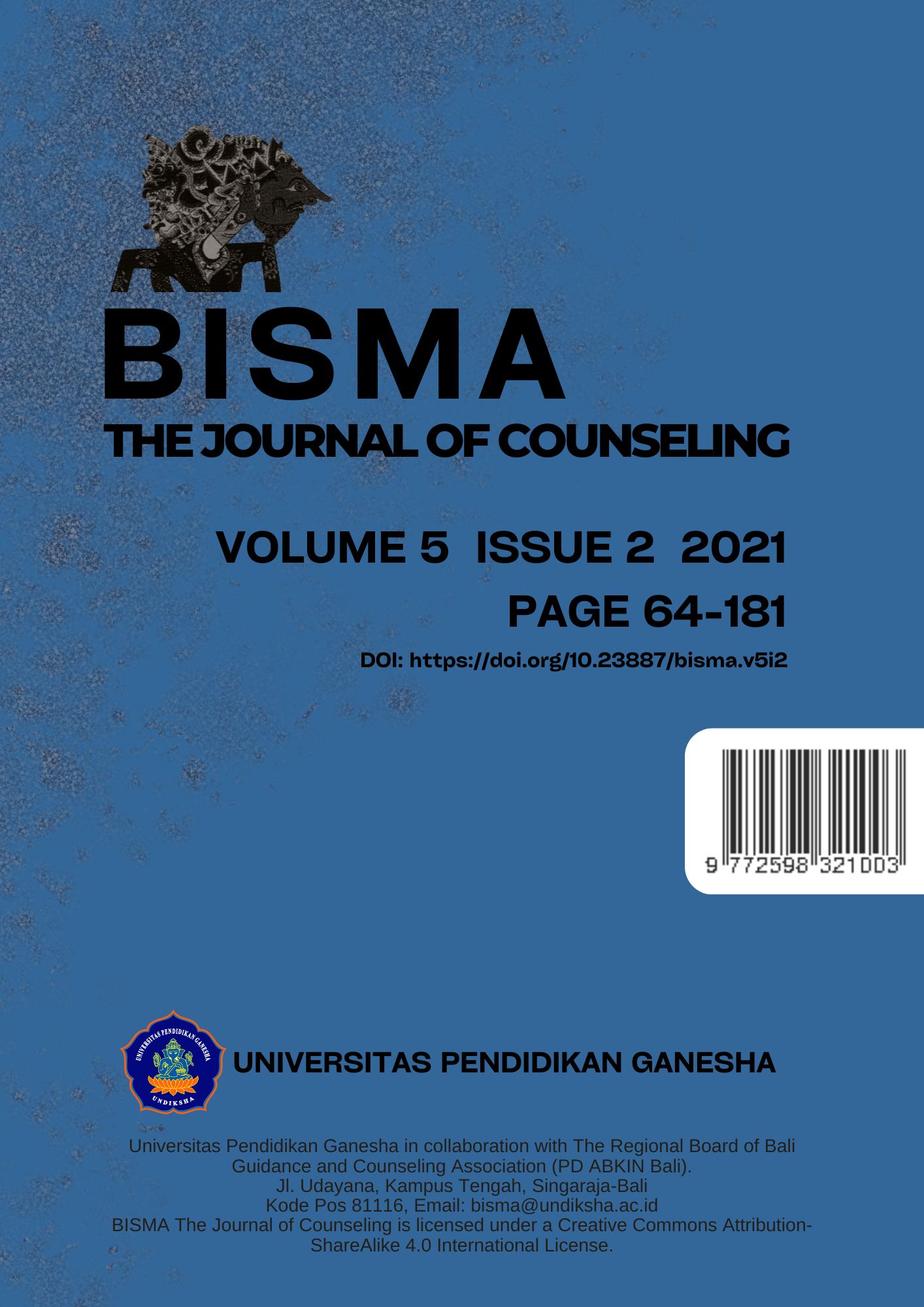Development of Self-Change Classical Guidance Module to Reduce Student’s Stress Due to COVID-19
DOI:
https://doi.org/10.23887/bisma.v5i2.37898Keywords:
Student’s academic stress, classical guidance, self-changeAbstract
The COVID-19 pandemic is affecting to the learning process in school. As an effort to reduce the spread of virus, all of learning activity now conducted via online. Various obstacles arise during the online learning. This new condition increase the level of student’s stress and requires students ready to make self-change. This study is research and development that aims to develop and evaluate the classical guidance module as an instrument to help students make self-change in order to reduce their stress. The development procedure conducted by following 4D model (Thiagarajan, 1974). Five expert involved as judges to evaluate the content validity of module and 30 students were involved as subject on piloting study. Results of expert judgement were analyzed using formula Lawshe and show the module has a “very special” content validity index ( CVI = 1). Results of piloting study show the module has “very good” category in all aspect of evaluation. Based on the results, it show that the classical guidance module developed in this study feasible to use as an instrument to help students make self-change in order to reduce their stress levels due to COVID-19.References
Budu, H. I., Abalo, E. M., Bam, V., Budu, F. A., & Peprah, P. (2019). A survey of the genesis of stress and its effect on the academic performance of midwifery students in a college in Ghana. Midwifery, 73, 69– 77. https://doi.org/10.1016/j.midw.2019.02.013.
Chaterine, R. N. (2020, March 18). Siswa belajar dari rumah, KPAI: Anak-anak stres dikasih banyak tugas.Detik News. Retrieved from https://news.detik.com/berita/d-4944071/siswa-belajar-dari-rumah-kpai-anak-anak-stres-dikasih-banyak-tugas.
Corey, Gerald, 2015, Teori Dan Praktek Konseling Dan Psikoterapi, Cet VII, (Bandung: Refika Aditama).
Desmita. (2010). Psikologi Perkembangan Peserta Didik. Bandung: Remaja Rosdakarya.
Dharsana, I Ketut. (n.d.). Pengembangan pribadi konselor (2018th ed.). BK FIP UNDHIKSA.
Dharsana, I Ketut. (2015b). RPBK untuk pengembangan variabel terikat bakat (05 juni 2015). BK FIP UNDHIKSA.
Dharsana, I Ketut. (2015c). RPBK untuk pengembangan variabel terikat minat—1. BK FIP UNDHIKSA.
Dharsana, I Ketut. (2015d). RPBK untuk pengembangan variabel terikat self -3 (2015th ed.). BK FIP UNDHIKSA.
Hastini, L. Y., Fahmi, R., & Lukito, H. (2020). Apakah pembelajaran menggunakan teknologi dapat meningkatkan literasi manusia pada generasi Z di Indonesia ? Jurnal Manajemen Informatika (JAMIKA), 10(1), 12–28.
Hughes, R.G (2008). Patient Safety and Quality: an evidence base handbook for nurses.Rochville MD: Agency for Healthcare Reseach and Quality Publication
Kementrian Kesehatan. (2020). Situasi Terkini Perkembangan Coronavirus Disease (COVID-19) https://covid19.kemkes.go.id/situasi-infeksi-emerging/info-corona-virus/situasi-terkini-perkembangan-coronavirus-disease-covid-19-31-mei-2020/#.XtRqYb4xWNw
Lawshe,C. H.. (1975). A Quantitive Approach to Content Validity. Purdue University: Personnel Psychology, Inc. Hlm. 563-575.
Muharrifah, A. 2009. Interaksi antara Remaja, Ayah, dan Sekolah Serta Hubungannya dengan Tingkat Stres dalam Menghadapi Ujian Nasional(Doctoral dissertation).
M. C., Brunello, N., & Tascedda, F. (2019). Modulation of neuroplasticity-related targets following stress-induced acute escape deficit. Behavioural Brain Research, 364, 140–148. https://doi.org/10.1016/j.bbr.2019.02.023
Pat Walker Health Center, University of Arkansas. (n.d.). COVID-19 workshop: How to manage your anxiety effectively. https://health.uark.edu/coronavirus/caps-covid-19-resources-anxiety- workbook.pdf
Strielkowski, W. (2020). COVID-19 recovery strategy for tourism industry COVID-19 recovery strategy for tourism industry. March, 1–3. https://doi.org/10.13140/RG.2.2.19039.82086
Sugiyono. (2018). Metode Penelitian Kuantitatif Kualitatif dan R&B. Bandung: Alfabeta.
Szalavitz, M. (2011).“Tapping Potential: Stand and Deliver”.Psychology Today.50-54.









